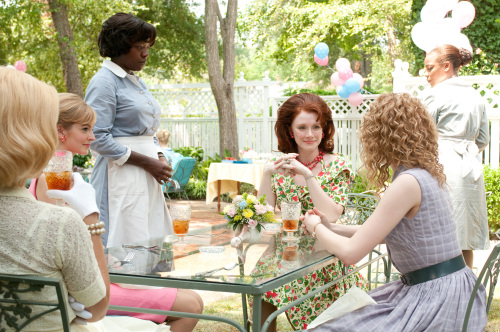Viola Davis didn’t want to wear the uniform. The Oscar-nominated actress was thrilled at the chance to star in “The Help,” the film based on the best-selling novel by Kathryn Stockett. But it was a movie about maids in the Jim Crow South.
And “I had to get past the fact that I’d be playing a maid.”
It’s an image heavy with history and meaning ― the black maid in uniform ― raising upper-class white children in the segregated South. More than 70 years after “Gone With the Wind,” the “mammy” stereotype that Hollywood happily embraced and then rejected still carries weight within the black community.
“My grandmother was a maid. My dad’s mom and my dad’s sister were maids in Florida and Georgia,” says Dr. Rebekah McCloud, 59, an administrator at the University of Central Florida. “Our parents’ generation kind of hid all this stuff from the younger generation. People my mom’s age ― she’s 88 ― never talked about it. These were people who were embarrassed to be maids or to admit they were maids, groundsmen, domestics working for white people.”
“I’m still ambivalent about seeing a movie about a cast of black women as maids,” says Ruth Edwards, 56, coordinator of adult education at a Central Florida library. “But on the other hand, it is a cast of black women as maids. You never see that in the movies.”
 |
Viola Davis (standing at left) stars in “The Help” with Bryce Dalls Howard (center), Ahna O’Reilly (left), and Emma Stone (right). (Dale Robinette/Dreamworks/MCT) |
Both women had just seen ― and raved about ― “The Help,” which opens Wednesday. But their reactions underline the tricky job DreamWorks has selling the movie to audiences. Will whites want to be reminded of that ugliness in pre-integration South? Will blacks?
Stockett’s 2009 novel relates a series of oral histories by Southern maids in the 1960s. It was inspired by the author’s childhood in Jackson, Miss., where she has said she was raised by her family’s housekeeper.
DreamWorks, the studio releasing “The Help,” has been previewing the film for a month. And while it was shown at the NAACP national convention in July, a DreamWorks spokesperson said there is no customized marketing for the movie. Preview audiences have been seeing it through the usual “opinion leader” showings, and radio station and newspaper ticket giveaways.
Will those efforts persuade filmgoers to get past the subject, the same thing that made Davis hesitate before taking the role of Aibileen, a black maid raising white babies and dealing with their racist parents?
“People assume it’s that same old story, race in the South,” says co-star Octavia Spencer, who plays the feisty maid Minny. “But it’s being told from a different perspective. That in itself is a huge feat.”
The movie’s August release “seems like a bid for mainstream drama success in the vein of Julie & Julia’ and ‘Eat Pray Love,’” says Brandon Gray, box office analyst for boxofficemojo.com. “When this project was announced, hopes were high ... The advertising so far, though, has lacked punch ... subdued and genteel.”
Gray points out that there are few precedents for pitching a movie with civil-rights themes to potential niche audiences. But among those who have seen it, the praise can be tearful.
“This movie hurt. Deeply. It’s a painful memory,” says Marjorie White, 72, a Pittsburgh native whose mother was a maid “and often took me with her” to the job. “I heard how her employers talked to her, so I know how authentic this is. But do young people today know this history? They need to.”
Davis, who turns 46 the day after the movie opens, was born in South Carolina but grew up in Rhode Island. Spencer, 39, grew up “at the end of the civil rights era” in Montgomery, Ala.
“The responsibility of image and message is heavy on the backs of actors of color. We have a larger responsibility to fill. We’re not just artists,” says Davis. Spencer agrees.
Yet neither actress wants “The Help” to be perceived as just “a cause.”
“It’s ultimately a movie about relationships that cross generations, colors,” says Davis. “Yes, (the South) is a place with a violent history, a place with second-class citizens who could only find work as maids, but a place that’s more complicated than those two simple facts.”
“Families have been saying, ever since the civil rights movement, that ‘I don’t want my kid to go through what I went through,’” Spencer adds. “We’ve lost the tradition of teaching what a struggle it was and the fact that there was a struggle.
“So this film could be very foreign to the younger generations of movie goers. And that’s a good thing.”
By Roger Moore, The Orlando Sentinel
(McClatchy-Tribune Information Services)








